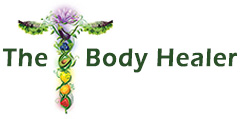Raw Food FAQs
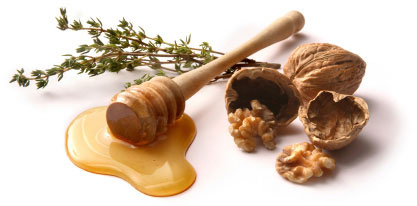 Even though a raw food diet is highly nutritious and provides you with all the protein and nutrients your body needs, some people do not thrive on raw foods alone, and do much better when incorporating some cooked foods. Some people thrive on raw vegan diets, while others do better with some.
Even though a raw food diet is highly nutritious and provides you with all the protein and nutrients your body needs, some people do not thrive on raw foods alone, and do much better when incorporating some cooked foods. Some people thrive on raw vegan diets, while others do better with some.
Paying close attention to how your body responds and reacts to the foods you give it, and honoring its needs as you change and evolve over time is much more important than a percentage. You may find that a 75% raw diet may be the perfect approach for you, or that more suits you just fine..
Let's cover some of the commonly asked questions my clients ask when it comes to eating a raw food diet:
Where will my protein come from?...
Protein is made up of two kinds of amino acids:
- Essential amino acids (which we must get from the food we eat)
- Non-essential amino acids (our body can make these)
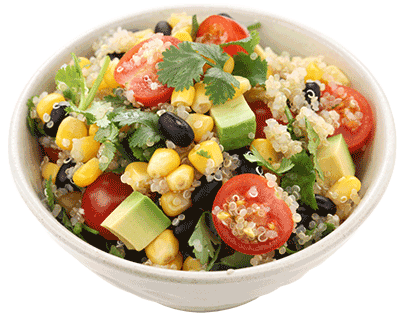
A food that is called a "complete protein" contains all 9 of the essential amino acids. Plant foods are very high in amino acids, which are the building blocks of protein. Fruits, vegetables, and sprouted grains all contain various amino acids, and average about 4% protein. One look at animals such as gorillas and cows and you will see that they receive all the protein they need from plant food. Gorillas are the most powerful animals on earth and certainly do not lack any strength or stamina from a "protein deficiency."
Sprouted grains and legumes contain higher protein content and are a healthy and nutritious source of protein. Quinoa is one of the best protein sources on the planet and is so versatile it can be mixed in salad, meals, dips, or desserts. Nuts also contain protein to a lesser extent.
Nix the protein shakes
The only reason people on a raw food diet feel like they need to drink protein shakes and eat large amounts of meat to "get enough protein" is because of very savvy advertising campaigns developed by the meat, dairy, and supplement industry. Artificial protein supplementation is a multi-billion dollar business, with heavy targeting toward bodybuilders. It is also one of the worst offenders when it comes to a healthy diet. The product advertising is so persuasive, we wonder how we could ever be healthy without them... (cough). Depending on your activity level, the amount of food you need may increase, but the ratio of protein should not, and a maximum of 10% is more than sufficient for vibrant health.
It is interesting to note that that breast milk, the high-quality protein needed for babies when they are growing at a tremendous rate, contains a very small amount of protein - up to 4% - which is coincidentally the average amount of protein contained in fruits and vegetables.
Can I still have seasonings?...
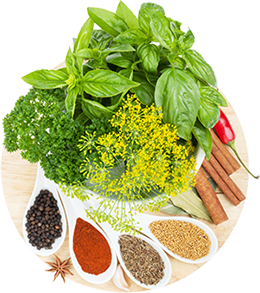 Absolutely! There are hundreds of spices and seasonings available from all around the world that can add a wide variety of tastes to tantalize our taste buds. Use fresh and organic whenever possible. Most produce departments offer mini packets of fresh herbs such as thyme, oregano, rosemary, mint, tarragon, basil, chives, and others. For other ingredients such as sea salt, cracked pepper, and turmeric, show your love for the environment by purchasing organic and sustainably sourced.
Absolutely! There are hundreds of spices and seasonings available from all around the world that can add a wide variety of tastes to tantalize our taste buds. Use fresh and organic whenever possible. Most produce departments offer mini packets of fresh herbs such as thyme, oregano, rosemary, mint, tarragon, basil, chives, and others. For other ingredients such as sea salt, cracked pepper, and turmeric, show your love for the environment by purchasing organic and sustainably sourced.A great way to have fresh herbs every day is to purchase an herb basket from a nursery, which you can hang in your garden or place on your balcony.
Can I eat raw meat, fish, & dairy?...
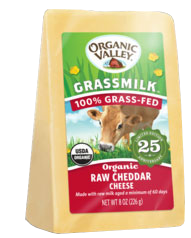 Yes. Contrary to the belief of some raw foodists, raw meat and fish is not a "biologically inappropriate food." Those following the Natural Hygiene philosophy feel very strongly that humans are not carnivores, and were never biologically built to eat flesh products. This is not true. We were not biologically built to eat the highly processed, chemicalized, genetically modified, irradiated, factory-farmed meat and seafood of today, but the study of traditional cultures and their indigenous diet shows that not only did they eat meat and dairy, but some had a diet very high in these products. Vegetarianism was rare. Not only that, they were robust and healthy, and experienced none of the chronic diseases and age-related degeneration suffered today.
Yes. Contrary to the belief of some raw foodists, raw meat and fish is not a "biologically inappropriate food." Those following the Natural Hygiene philosophy feel very strongly that humans are not carnivores, and were never biologically built to eat flesh products. This is not true. We were not biologically built to eat the highly processed, chemicalized, genetically modified, irradiated, factory-farmed meat and seafood of today, but the study of traditional cultures and their indigenous diet shows that not only did they eat meat and dairy, but some had a diet very high in these products. Vegetarianism was rare. Not only that, they were robust and healthy, and experienced none of the chronic diseases and age-related degeneration suffered today. Learn about the diet of traditional cultures...
The Inuit Eskimos are a clear example of a culture whose indigenous food mainly consisted of raw meats and fish on an very high fat diet, yet long-term explorative studies revealed that they never experienced any of the chronic and degenerative diseases in the westernized world today. It was only when food industrialization expanded the availability of westernized foods that our diseases appeared into these cultures.
Food Safety
The issue of food safety is, however, an entirely separate matter. Yes, you can get sick from eating raw meat and fish (as those of us who eat sushi are aware). Yes, you have to be very careful about where you buy raw meat and fish and how you handle it. Like any food, if it is from an unsanitary environment or you are not careful about how you store it, then you put your health at risk.
Raw cheese is now available in almost every major supermarket chain in the natural food section. Raw milk is also available in several states for purchase, whereas it is still illegal in others. Always ensure you only purchase raw meat and dairy from a reputable manufacturer.
What can I eat on a raw food diet?...
| Raw Non-Vegetarian | Raw Vegetarian | Raw Vegan | ||
| Raw fruits Raw vegetables Raw nuts* Raw seeds* Raw honey Sprouted legumes Fresh herbs Raw meat Raw fish Raw eggs Raw dairy (milk/cheese) |
Raw fruits Raw vegetables Raw nuts* Raw seeds* Raw honey Sprouted legumes Fresh herbs Raw eggs Raw dairy (milk/cheese) |
Raw fruits Raw vegetables Raw nuts* Raw seeds* Sprouted legumes Fresh herbs |
* Soak nuts and seeds overnight before eating to increase their digestibility

What about alcohol & coffee?...
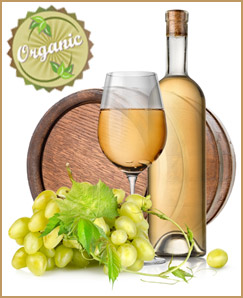
When it comes to alcohol, cut out the hard liquor and instead, aim for organic wine and drink it in small quantities. Hard liquor is very destructive to the body.
When it comes to caffeine, recognize it is a powerful stimulant that artificially jolts your nervous system. Millions of people worldwide feel they cannot function without beginning their day with a coffee-fix. The "fix" is always temporary and we crave more to experience the same feelings of well-being. If this sounds like you, then you have a caffeine addiction. Over the long term, the constant and forced stimulation of our nervous system damages the resilience of the immune system, as well as contributing to adrenal fatigue, chronic fatigue, and other conditions. Isn't it time to walk away from this addiction for good? Of course it is!
What are enzymes & why are they so important?...
On a diet of predominantly cooked foods, we deplete our own enzyme potential earlier in life and we lose our ability to properly digest foods as we age. This contributes to the gastrointestinal problems rampant in those who have reached old age and are forced to become reliant on probiotics and external supplementation to help digest and assimilate food.
 Learn more about the link between enzymes from whole foods
Learn more about the link between enzymes from whole foods& the health of our pancreas, brain, and other organs:
The Body Healer Protocol...
Why should I soak nuts before I eat them?...
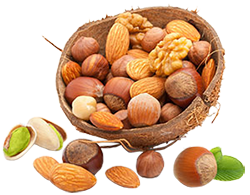 Have you noticed that you find it difficult to digest nuts and seeds, or that they make you feel uncomfortable and bloated after you eat them?
Have you noticed that you find it difficult to digest nuts and seeds, or that they make you feel uncomfortable and bloated after you eat them? Soaking nuts and seeds makes it easier for your body to digest them, and here's why. Enzymes present in uncooked foods may help your body to digest them, but certain foods are high in what we call "enzyme inhibitors." Nuts, seeds, beans, and grains are great examples of foods that are wonderful sources of natural protein and fat, but the enzymes present in these foods cannot be used by the body due to the enzyme inhibitors until it is time for them to germinate (sprout) in the soil to form a seedling. Once they germinate, the enzyme inhibitors are neutralized and the enzymes are released.
In the wilderness, animals such as squirrels instinctively know to bury nuts. They later dig them up after the enzyme inhibitors have been neutralized.
Simply soak your nuts or seeds overnight and drain them the next morning. Soak in small batches, as they become more perishable after soaking.
What are the biggest pitfalls to avoid on a raw food diet?...
What is the acid/alkaline balance & why is it important?...
Can I eat sea vegetables?...
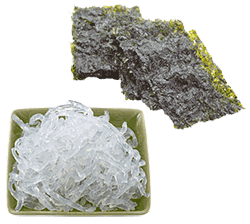 Yep! Examples of sea vegetables include wakame, nori, dulse, kelp, kelp noodles, as well as others. They are high in marine phytochemicals and contain significant amounts of vitamins and minerals (especially iodine). Nori, for example, contains as much protein content as soybeans. Raw sea vegetables are available from many health food stores in different forms, including dried, powdered, and freeze-dried.
Yep! Examples of sea vegetables include wakame, nori, dulse, kelp, kelp noodles, as well as others. They are high in marine phytochemicals and contain significant amounts of vitamins and minerals (especially iodine). Nori, for example, contains as much protein content as soybeans. Raw sea vegetables are available from many health food stores in different forms, including dried, powdered, and freeze-dried. Kelp noodles are especially yummy. They do not taste like an "oceanic" food at all (no seaweed taste). In fact, they really have no "taste" to speak of and absorb the taste of the sauce you mix them with. The have an interesting crunchy yet chewy texture , and their bland flavor makes them a great highly nutritious "pasta" that can be mixed with vegetables, sauces (especially a pesto sauce), or a raw version of marinara sauce to create a wonderful and light meal.
Do I still have to drink "8 glasses of water" every day?...
You will find that when you eat plenty of fresh fruits and vegetables, you will need much less water, tea, or other liquid drinks.
What is detoxing & will it happen to me on a raw food diet?...
But when we keep on supplying our body with the standard American diet of chemicalized food, chemicalized water, air that is not fresh and contains contaminants, and the chemicalized personal care products we put on our skin (soaps, creams, shampoos, and sunscreens filled with many unpronounceable chemicals), we force our elimination organs to work overtime. Add to this the debilitating effect of stress, and not only does the body not have enough time to rest, but it is always in a reactionary mode. It becomes overwhelmed and is unable to keep up, setting the state for health issues and chronic disease.
When we go on a raw food diet, we are no longer ADDING to the toxic overload the body is already suffering from. Our elimination organs are now able to focus on cleaning up the years of toxic waste that have accumulated throughout our body. This sudden release of waste into the bloodstream for elimination is called "detoxification.".
Never rush detoxification as you will overwhelm your elimination organs. The key is to not prevent or suppress (or rush) detox symptoms with any medications or herbs, but rather allow the body to detoxify at its own pace using fruits and vegetables. Avoid using medications to suppress symptoms, which causes the body to now work even harder to expel these additional foreign substances (medications are foreign substances).
 Cleanse & Detox Programs
Cleanse & Detox Programs
When it comes to doing a detox or a cleanse, there are many now on the market, and they range from $50 all the way up to $200 or more. There should never be a reason to spend money on expensive programs to learn how to detoxify your body! The only money you should have to spend is on the high water content fruits and veggies you will be eating.
Definitely reconsider any program that includes a large amount of supplements or herbs. There is no healthier or better method of detoxification than using fresh, organic fruits and veggies. Artificially stimulating it with herbs is not in your body's best interest.
 Discover the quickest, healthiest, and most powerful way to detoxify your body:
Discover the quickest, healthiest, and most powerful way to detoxify your body:The Body Healer Protocol...
Detoxification Symptoms
When we detox, we can experience a range of short-term symptoms, including:
- Headaches
- Acne and skin eruptions
- Fatigue
- Brain fog
- Diarrhea, constipation, and general gastrointestinal issues
These symptoms are usually very temporary and run their course over several days. The higher the toxic load in the body, the more uncomfortable the symptoms can be.
What about B12 & other supplements - do I need them?...
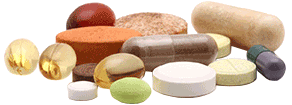 There is a right way to use supplements, and a wrong way. The right way to use them is for a period of time to help you heal from a health condition, and only from natural sources. When your health condition is resolved, you no longer need them. The wrong way is to assume you need them, indiscriminately use them, and not take the time to understand their impact on your body.
There is a right way to use supplements, and a wrong way. The right way to use them is for a period of time to help you heal from a health condition, and only from natural sources. When your health condition is resolved, you no longer need them. The wrong way is to assume you need them, indiscriminately use them, and not take the time to understand their impact on your body.
- Raw supplements extracted from whole foods, and synthetic supplements two very different things. Synthetic supplements (the majority on the market) are harmful to your body, and some commonly used supplements have been definitively linked to serious health conditions.
- Taking isolated nutrients in supplements is not the same as eating whole foods. For example, studies have shown there is a direct correlation between low vitamin C in the body and those who have cancer, yet when patients were given synthetic vitamin C supplements, it made little difference. The studies concluded that it is not only the vitamin c that is protective against cancer, but that other protective compounds in whole, natural foods work synergistically with vitamin C in protecting the body. In other words, do not waste your money on vitamin C pills - eat fruits and veggies high in vitamin C instead.
Are all raw food diets the same?...
Is it hard to transition from a cooked to a raw food diet?...
Cravings will come and go, as will symptoms of detoxification. A slow and steady transition, while understanding how to set yourself up for success and avoiding the pitfalls is the best approach.
How will my body begin to adjust to a raw food diet?...
Experiment with increasing the amount of raw foods you eat, and see what happens. Some feel physically and mentally better on a high percentage of raw foods, whereas others feel fantastic going 100% raw.
Do I need to calculate, measure, or weigh my food?...
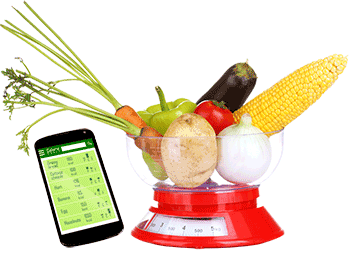 Not unless you want to, or you are following a recipe. The caveat to this is to be mindful of the amount of fatty foods you eat on a raw food diet (such as nuts, seeds, olives, and avocados). It is very easy to overeat these foods. On a daily basis, limit nuts and seeds to a small handful, or perhaps add 1/3 to a 1/2 of an avocado in a salad or a wrap.
Not unless you want to, or you are following a recipe. The caveat to this is to be mindful of the amount of fatty foods you eat on a raw food diet (such as nuts, seeds, olives, and avocados). It is very easy to overeat these foods. On a daily basis, limit nuts and seeds to a small handful, or perhaps add 1/3 to a 1/2 of an avocado in a salad or a wrap. Avoid liquid oils, or when you do use them, keep them to an absolute minimum and ensure they are:
- Cold pressed / unrefined and organic
- Nut, fruit, or seed-based oils (e.g. coconut, flax seed, olive and walnut oil).
Always remember that liquid oils are a 100% fat product that has been fractionated from its original whole food. A far better way to use liquid oils is to use them as a massage oil on your body!
How do I make my own home-made V8 juice?...
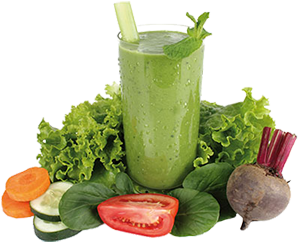 There are so many different and flavorful ingredients you can use to make raw fruit and vegetable drinks!
There are so many different and flavorful ingredients you can use to make raw fruit and vegetable drinks!Home-made V8 Juice
The most exciting and refreshing version of a home-made V8 (and the one I use) is:
- Carrots (2 large)
- Cucumber (1/2)
- Celery (3 stalks)
- Beets (1 medium, with leaves/stalks)
- Kale (1/2 bunch or more)
- Tomato (2 medium)
- Lemon (1 whole)
- Ginger (1 inch chunk)
Fruit Smoothie
For an incredibly tasty fruit smoothie, try the Fruity Rini:
- Coconut water (8-10 oz)
- Kale, spinach, or Swiss chard (1/2 bunch or more)
- Banana (1 medium)
- Pineapple (2 chopped slices)
- Berries (1 cup or more of your choice)
Because both the juice and the smoothie are in liquid form, they are very quickly assimilated by your body and flood your body with "liquid light" energy. Always try to purchase organic and avoid produce with any pesticides. Be especially mindful of ginger, the majority of which is imported from China.
Is it true that onions, leeks, & garlic are "toxic"?...
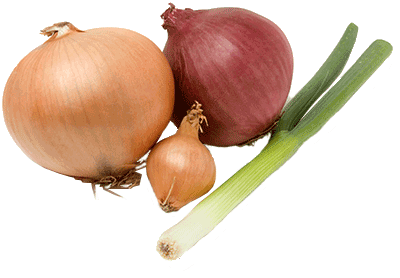 For example, the allinase found in allium vegetables (onions, garlic, leeks, scallions/spring onions, and chives) contains alliin, which is converted to allicin. Allicin has antimicrobial, antithrombotic, antiarthritic, anticancer, and lipid lowering capabilities.
For example, the allinase found in allium vegetables (onions, garlic, leeks, scallions/spring onions, and chives) contains alliin, which is converted to allicin. Allicin has antimicrobial, antithrombotic, antiarthritic, anticancer, and lipid lowering capabilities.
Important!! As a side note, adding onions, scallions, or leeks to your veggie juices can make them taste downright awful! I do not recommend adding them to any juices simply because they taste terrible in liquid form. Garlic is an exception and can give a nice shot of "spice" to any raw drink.
